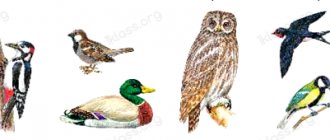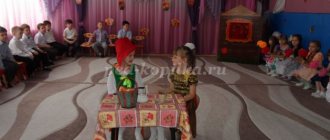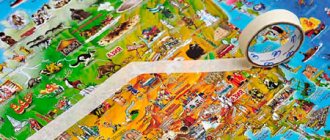Project on the topic: “Travel to cities of the world” for 4th grade.
Project goal: Develop a travel route to cities around the world.
Select cities with the most interesting sights. Prepare a presentation on the subject “The World Around You”, write a report or message. Mark the route on a geographical map. Tell schoolchildren about the work done, answer questions, defend the project. Project plan:
- Introduction
- Novosibirsk
- Saint Petersburg
- NY
- Hamburg
- Rome
- Athens
- Conclusion
- Example of a finished presentation
Project "Our Travels"
Project "Our Travels"
Project type:
- Long term
- Cognitive - creative
- Informational
Project participants:
- Children of the preparatory group
- Educators
- Musical director
- Physical education instructor
- Parents
- Social institutions: family reading library, music school, art school, Fakel sports complex
Relevance of the topic
A child’s first ideas about himself and the world around him are usually very fragmented and unsystematic.
Adult task
– to help understand and understand the diversity of the world. Our students, like many of their peers, travel a lot. Together with their parents, children travel to memorable places in our country, and also vacation in many foreign countries. In selecting countries to familiarize ourselves with, we decided to rely on the children’s existing experience.
Children's acquaintance with the countries and peoples of the world must begin with the organization of a developing subject-spatial environment. To do this, our group began collecting materials on this topic:
– selection of illustrations, pictures, photos (national costume, flag and coat of arms of the country, famous monuments, attractions, etc.);
– selection of works of world artistic culture (fairy tales, poems, folklore of the peoples of the world);
– selection of outdoor games from different countries;
– selection of interesting educational information about the capitals of states, traditions of peoples, main attractions.
Introducing children to the countries and peoples of the world, world culture and world values, the best literary works and attractions and familiarizing them with them is an important educational task. For preschoolers, familiarization with the culture of different peoples is a world of unknown things and vivid impressions. If this world becomes close and understandable from childhood, then the child will develop a need to learn historical information, high cognitive activity, and a desire to appreciate the merits of the cultures of other peoples, which, undoubtedly, will be an integral feature of his spiritual formation and social development.
This is what determined the choice of the topic of project activity.
Objective of the project:
Expanding the horizons of preschoolers, developing regional competence.
Project objectives:
Educational:
To cultivate interest and respect for people of different nationalities, their traditions and culture. Cultivate a readiness for mutual assistance in the process of communicating with adults and peers. Develop self-confidence and positive self-esteem by creating a situation of success in various types of children's activities.
Educational:
To develop communication skills in preschoolers through creative interaction with adults and peers. Support children's initiative, desire for cognitive and research activities and independence in the implementation of creative ideas. Develop the ability to carry out the components of an activity: perception of a goal, planning an activity, choosing a means to achieve a goal in the process of joint planning of a travel route. Develop mental operations: analysis, synthesis, comparison, generalization, classification. Develop volitional self-regulation of behavior.
Educational:
Introduce the cultural traditions of the peoples of the world and the sights of countries. Expand preschoolers’ understanding of the lives of people in other countries. Systematize knowledge about the ethnographic conditions of the population of different states.
Planned results:
My horizons have expanded.
Initial ideas about the life of people in different countries and interest in the culture of other peoples appeared.
The makings of a tolerant attitude towards other peoples have been formed.
Knowledge about the ethnographic conditions of the population has been systematized.
Developed personality traits: independence, initiative, communication, hard work.
Children enter into communication in the process of joint activities.
Positive self-esteem of children was formed during the implementation of the project.
Mental operations and volitional self-regulation of behavior are developed.
Principles:
The implementation of the goals and objectives of the project is based on the principles:
- Scientific principle
- The principle of activity and consciousness
- The principle of complexity and integrativeness
- The principle of succession
- The principle of independence
- The principle of individuality
- Accessibility principle
- The problematic principle
- Taking into account the age and individual characteristics of children
Project stages
Preparatory stage:
- Selection of literature, visual and didactic materials: educational board games, illustrations, albums, collection of dolls in national costumes; presentations and videos
Report to the project:
I would start my journey with the cities that arose in modern times.
Novosibirsk
It appeared at the beginning of the 20th century, and can be classified as a city of modern times. Novosibirsk is a large city with a population of 1.6 million people. The most famous sights of Novosibirsk are the oceanarium, the opera and ballet theater, the local history museum, and the arboretum.
From Novosibirsk you can go to St. Petersburg.
Saint Petersburg.
It was founded by Peter the Great in 1703, that is, at the beginning of the 18th century. This is one of the most beautiful cities in Russia and the whole world. It has many unique palaces, cathedrals, and drawbridges across the Neva.
The most important sights of the northern capital are the Peter and Paul Fortress and the Winter Palace. Any guide will tell you about them in detail.
NY.
Now we will go overseas and visit New York.
It is one of the largest metropolitan areas in the United States, which lies on numerous islands off the east coast of America. The largest and most famous of them is Manhattan Island, the historical center of New York. The symbol of the metropolis is the wonderful Statue of Liberty.
New York was founded in the early 17th century, in 1624, by English settlers.
Hamburg.
Let's return to Western Europe.
Hamburg was founded in 810. This is one of the most beautiful metropolises in Germany, with many theaters, churches and palaces. Hamburg is a seaport and in the Middle Ages it was one of the centers of European trade.
Rome.
The eternal city of Rome is located in Italy. It was founded in the 8th century BC. It is a monument city that houses the famous Colosseum and St. Paul's Cathedral.
The central part of Rome is occupied by the Vatican, a region-state in which the residence of the Pope, the head of all Catholics, is located. In the square in front of the Vatican is the most famous fountain in Europe - Trevi.
Athens.
We will end our journey into the past in Athens
Historians still do not know the exact time when it was founded.
They name the date – 7th millennium BC. Athens is one of the oldest cities on the entire planet. And he is very handsome. In the center of Athens, on a hill, lies the Acropolis, an ancient temple complex topped by the ruins of the famous Parthenon. Photos of these monuments will decorate any album.
Conclusion:
There are a variety of cities in the world, very ancient and very young. Each of them has its own history, attractions and is beautiful in its own way. Each one contains people who love their hometown and are proud of it. There is so much beauty and wonder in the world!
Content
- 1 Author of the project
- 2 Project topic
- 3 Project name
- 4 Subject, group
- 5 Brief summary of the project
- 6 Guiding questions 6.1 Guiding question
- 6.2 Problematic issues
- 6.3 Study questions
Useful resources
1. Kaverina V., Boyko V., Zhidkikh N. 100 topics of the English language for schoolchildren and students. – M: BAO-PRESS, 2002.
2. Sergeev S.P. 120 conversation topics. –M: Publishing house A.D.V., 2003.
3.Travel in English. https://engtexts.ru/travelling.php
4. Stories, topics in English. https://www.learnenglishbest.com/rasskazy-articles.html
5. Lesson topic: “The journey of our lives - part 2.” In English with pronunciation. https://puzkarapuz.ru/content/2355
6. Topics (topics) - English. https://abc-english-grammar.com/1/sochinenia_po_angliiskomu_yaziku.htm
7.Oral topics in English. https://english-lessons-online.ru/chitalka/topics/puteshestvie-i-turizm
8.English theme “Travel”. https://enjoyeng.ru/razgovornik-anglijskogo-yazyka-onlajn/anglijskaya-tema-puteshestviya
9. “Travel” in English. https://englishocean.ru/index.php/temy/34-engtheme/108-tema-puteshestviya-po-anglijskomu
10.Theme travel. Topic on the English language. https://online-teacher.ru/blog/english-topik-puteshestvie
Hello! We invite you on the trip of your dreams!
FAQ
1. How to take part in the project. What to do?
The project can be attended by citizens of the Russian Federation and foreign citizens - participants in competitions and projects of the ANO “Russia - the Land of Opportunities” and the Russian Society “Knowledge”, who have registered in their Personal Account on the website https://rsv.ru/ and provided reliable information about themselves . The criteria for encouraging participants are determined by the Regulations on the “More Than a Travel” project.
2. If I participate in the project, will I definitely go?
The decision to award participants with free tourist trips is made by the project’s expert council based on the lists submitted by the project organizers and in accordance with the Regulations on the “More Than a Travel” project. The more actively you show yourself by participating in projects, the more likely it is that you will be among those awarded.
3. How do you understand that you have been awarded a free tourist trip?
A notification letter about the opportunity to go on a free tourist trip will be sent to the email address with which you registered on the website https://rsv.ru/, and this information will also be reflected in your personal account on the website https://rsv.ru/.
If the participant does not have a personal account on the website rsv.ru, then he receives a notification about the assignment of a certificate indicating the need to register on the website of the ANO “Russia – Land of Opportunities” to the email specified in the competition application.
4. I am the winner of the project, fellow winners received a notification, but I did not. What to do?
A. Check the email you used to register on the RSV website. An invitation must come to her.
B. Check with your project management to see if you have been included in the list to participate in the “More Than a Travel” project?
Q. If you have been put on the list to participate in the project, but the invitation has not yet arrived, it means that the request for its provision is being processed and will be sent in the near future.
D. If all your acquaintances who are winners of the project received a notification, but you did not, write to us by email. In the subject line of the letter, indicate “Notification.”
5. I missed the notification, the certificate has been revoked, what should I do?
If the certificate is canceled and you did not go to the website to select a tour, then within 5 days from the date of cancellation of the certificate, send an application by mail with a request to re-assign you a certificate for a free tourist trip. Please indicate “Application” in the subject line of the email. Be sure to include your details, the project from which you were applied, email, date of completion and sign. This can only be done once.
6. Is the trip completely free or is only part of it paid (travel/accommodation, etc.)?
The trip is a free gift to the participant. ANO "RSV" purchases the trip you have chosen for your benefit. Everything that is stated in the program of the selected tour is included in the price and does not require any expenses on the part of the participant.
Additional expenses that are not included in the trip program (transfer to the collection point, to the house from the end of the tour, travel outside the tour program, additional portion on the train, etc.) are paid by the participant independently.
7. Travel dates?
September 2021 – September 2022.
8. How long does one trip last?
Depending on the category of the certificate assigned to the participant, the trip can last from 2 to 14 days
9. Is PCR required when traveling? Who pays for it?
PCR test is MANDATORY (even if fully vaccinated). The PCR test can be either electronic or on paper. Express PCR test is not accepted. Validity period of the PCR test: 72 hours from the date of receipt of the result. The PCR test is paid for by the participant INDEPENDENTLY.
10. You need an exemption from university for the duration of the trip. What to do?
No later than two weeks before your trip, write a letter to [email protected] with the subject “Information letter: university.” In the subject of the letter, indicate your full name, course, group, full name of the educational institution, travel dates and to whom to send information about the release (full name, position).
11. I want to change my departure city, what should I do?
After choosing a tourist trip, changing the departure city is possible as a last resort and only if the tour operator has such an opportunity.
12. I want to change the dates of my tourist trip, what should I do?
After choosing a tourist trip, changing the departure date is possible as a last resort and only if the tour operator has such an opportunity.
13. Why am I offered tours only in the city that I have chosen as my departure point?
This option is possible if you have been assigned the travel category “Small Motherland” - a weekend trip. This category includes a trip within the region, the departure city that you have chosen.
14. I have limited health capabilities, can the chosen tourist trip be adapted for me?
Each issue related to the limited health capabilities of a project participant is resolved individually. To get a solution, describe your need in a letter marked “HIV” in the subject and send it to
15. I have a disability, can I go on a selected tourist trip with an accompanying person?
Each issue related to the limited health capabilities of a project participant is resolved individually. To get a solution, describe your need in a letter, indicate the subject “HIV” and send it to
16. I chose a tour, but received a positive PCR test result or got sick. What should I do?
Before the start date of the tour, you need to send a letter to [email protected] (send a copy of the letter) with the subject “PCR+” and attach to it a document confirming the test result. The trip will remain yours and will be rescheduled to other dates only if you send the results of the PCR test and/or a certificate of temporary incapacity for work (sick leave) before the start date of the tourist trip. Support phone number.
17. If I cannot travel due to a positive PCR test or illness, will I be able to go on another trip later?
Yes, if you sent supporting documents to [email protected] (send a copy of the letter) before the start date of the tourist trip.
18. I have chosen a trip, but I won’t be able to go. What should I do?
It is necessary to send a notification by email indicating the subject “REFUSAL” and describing the reason at least 15 days before departure on the trip. In the event of an unjustified reason for canceling a confirmed trip later than 15 days before departure, the participant is deprived of the opportunity to choose another tourist trip, if such an opportunity exists. Valid reasons: Illness confirmed by sick leave Positive PCR test.
19. I don't want to go on a trip. Give me my certificate in money.
The value of the services on the certificate cannot be cashed or used for a person not named on the certificate. In case of cancellation of the trip, the certificate is canceled and cannot be restored.
20. In what case may they not allow you to reselect a trip?
— if the participant has provided deliberately false information about himself; — if the participant did not notify the project organizers within the established time frame of his refusal from the confirmed trip; - if the participant has already gone on a trip earlier.
21. I want to go on a tourist trip with a friend. Is this possible?
These tours are designed specifically for participants in competitions and projects of the ANO RSV and the Knowledge Society. Unfortunately, it is not possible to include people who do not fall into this category.
22. My friend and I both won the project. Can we go together?
Yes, if your certificate categories match. To travel together, you will only need to choose the same tour on the same dates.
23. Can I go as an accompanying person on a tourist trip with my child?
No. Accompanying minors on tourist trips are provided by tour operators.
24. Our project has not yet completed its final. Will we be able to get a ride?
Yes, if the final of your project takes place before December 1, 2021.
25. Will there be specific travel itineraries telling us what places we will go to and what we will do? I don’t want to get a “pig in a poke.”
Information about the composition of a tourist trip is provided at the stage of selecting a trip. You can choose the most suitable one.
26. How and when will the participant receive their tickets and travel itinerary?
The participant receives tickets and a travel program after booking a tourist trip, filling out passport details and confirming all data with the tour operator. All information will be sent by email.
27. Do I have to check in electronically for a flight with seat selection?
Yes, you must check in for your flight yourself.
28. Where can I fill out requests for a seat on the train? Does the tour include a reserved seat or a compartment fare?
There is no choice of seat on the train.
29. I can only travel by train. Will the tour description immediately indicate the method of transportation?
The description of the tours will immediately indicate the method of transportation.
30. Is luggage included in the flight? How many kg?
The project administrator informs the participant about the availability and weight of baggage after confirmation of the application.
31. The result of my test will come at the beginning of the trip (night on the train). I will find out the result when I am already in the city of my trip. What should I do if it turns out to be positive?
Provide the result of the PCR test before travel.
32. I felt sick on the trip and ended up in the hospital. My return ticket was burned. Will insurance cover anything? Is it possible to transfer my return ticket to a later date?
Such situations are regulated with each participant individually.
33. After the participant returned from the tour, traces of property damage were discovered at the hotel. After determining the reasons and identity, where will the invoice be sent for compensation of losses?
According to the law, the consumer compensates for all losses.
Guiding Questions
Fundamental Question
Why do people travel?
Why do people travel?
Problematic issues
What's the best way to travel?
What's the best way for traveling?
What's the cheapest way to travel?
What's the cheapest way for travel?
Study questions
What types of travel are there?
What kind of transport do you use for travelling?
What type of transport is most popular?
Which transport is the most popular?
Project plan
Preparatory stage.
1) Preparation of the necessary printed materials: instructions on working with reference books, searching for information on the Internet and saving information objects on external media, instructions on constructing diagrams in a spreadsheet processor, preparing texts for statistical research.
2) Determine the time of classes in the computer lab, school media library and library.
3) Prepare the necessary books, electronic materials, links to Internet resources.
4) Check the availability of books, DVDs and CDs for use in the classroom.
5) Establish connections with other classes to help with surveys.
6) Schedule a time for consultations and an activity to complete the project.
7) Place information about the project in the school newspaper and on the school website.
 Determine how students collect and where they store the results of their work and how to check them.
Determine how students collect and where they store the results of their work and how to check them.
Main stage.
1) Introduce students to the criteria for assessing intermediate and final work.
2) Analysis of the collected material and instructions on further actions for students.
3) Organize students to carry out independent research and conduct surveys.
4) Discuss with students the forms of presenting the results obtained.
5) Evaluate the work done.
The final stage.
1) Thank everyone who helped with the project (certificates, letters of gratitude).
2) Posting information about the project and its results on the wiki page.
3) Reward the most distinguished students.







